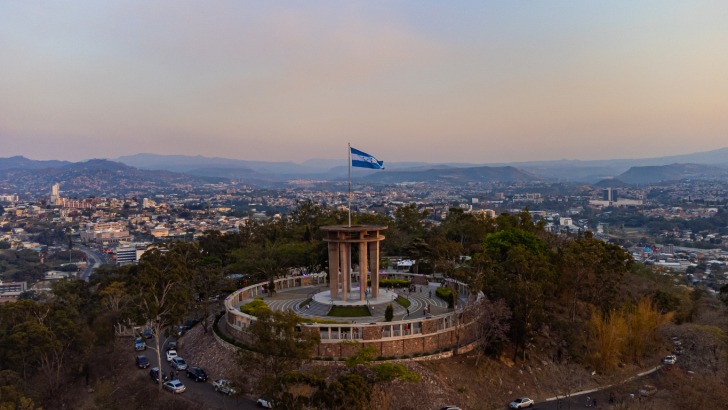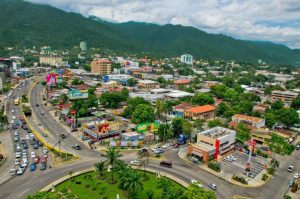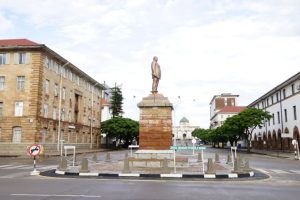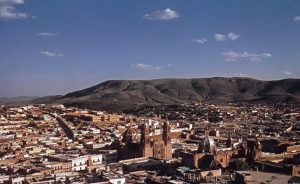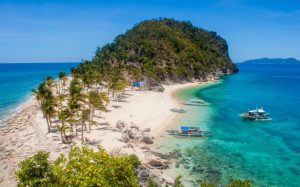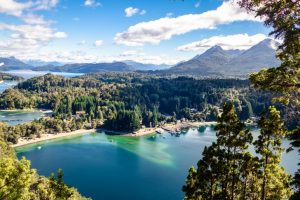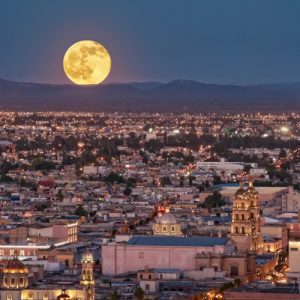Tegucigalpa, Honduras is a city with a mix of colonial buildings, modern structures, parks, and a variety of sites for travelers to see when they visit Tegucigalpa.
Founded by Spanish settlers in the 16th century as a gold and silver mining center, Tegucigalpa later became known for its banana trade.
Economic growth continued until a devastating hurricane wiped out much of the city’s reputation as an economic center.
Honduras has seen an increase in travel, with thousands more visitors taking a trip there in recent years.
Safety concerns are an issue that may make travelers wonder if it is dangerous for them to travel to Tegucigalpa, Honduras.
Warnings & Dangers in Tegucigalpa

OVERALL RISK: HIGH
Tegucigalpa, the capital of Honduras, poses a high overall risk of danger to travelers. Many travelers visit the area despite the risks. The desire to see the sites may outweigh the risk for some travelers. The U.S. Department of State issued a new travel advisory in July 2023. The Level 3 – Reconsider Travel advisory urges travelers to reconsider taking a trip anywhere in Honduras. The recent increase in kidnappings and violent crimes is the reason for the advisory.

TRANSPORT & TAXIS RISK: HIGH
Armed robberies and other crimes occur in broad daylight in taxis, buses, and other public transport vehicles. Do not take public transportation at night, even if you are traveling in a group.

PICKPOCKETS RISK: HIGH
Petty crimes occur frequently throughout Honduras, including in Tegucigalpa. Avoid making yourself a target by keeping your wallet, identification, and other items in front pockets, not back pockets.

NATURAL DISASTERS RISK: MEDIUM
Natural disasters such as earthquakes and floods occur in Honduras. Tegucigalpa may also experience mudslides, especially during the rainy season.

MUGGING RISK: HIGH
Mugging is a common crime that criminals commit in Tegucigalpa. Stay away from areas where you are more likely to be susceptible to mugging, such as dark or deserted areas.

TERRORISM RISK: MEDIUM
Global terrorism has been at the forefront of governments around the world in recent years. Honduras, including in Tegucigalpa, has experienced a significant increase in gang activity. Gang members kidnap wealthy residents, travelers, and other people to demand ransom payments. The Honduran government recently declared some organizations as terrorists and imposed a variety of sanctions on them.

SCAMS RISK: HIGH
Scammers often target travelers in Tegucigalpa and other areas of Honduras. The scams that occur are often the work of organized networks and not just the lone wolf scammer. Stay alert to possible scammers and protect yourself from becoming a scam victim. One scam occurs when the scammer pretends to be a police officer or a good Samaritan. Look at documents or badges carefully to make sure that they are not faked by scammers. Do not go with anyone who claims that they are from the police department or from the U.S. Embassy who are “here to help you.” Avoid local travel websites or other websites aimed at travelers. Do not book trips with local companies or agencies. Use reputable travel sites.

WOMEN TRAVELERS RISK: HIGH
Women should not travel alone to Tegucigalpa or anywhere in Honduras. The U.S. Department of State urges female travelers to be mindful of threats to women who travel alone on buses or other forms of public transport. It may seem enticing to have a night out on the town. Women should not go to bars or nightclubs alone. Do not accept drinks or food from strangers. Avoid leaving food or drinks unattended for even a few minutes. Odorless, colorless drugs are often used to spike drinks and food, especially that of women travelers.

TAP WATER RISK: HIGH
Do not drink tap water anywhere in Honduras, including while visiting Tegucigalpa. It is not safe for travelers to drink. Travelers should not eat fruit or vegetables that have been washed with tap water. Do not use ice cubes that are made using tap water.
Safest Places to Visit in Tegucigalpa
Visit the Cristo del Picacho Lookout with a group.
Do not visit the lookout by yourself.
Travelers often visit the United Nations National Park.
It is located on El Picacho Hill and is a popular place to visit for residents and tourists.
Hike across the La Tigra National Park Tegucigalpa with a tour group.
Do not hike anywhere alone or even in a small group.
Book a city tour with a reputable company to enjoy the sites around the city.
Places to Avoid in Tegucigalpa
Several areas and neighborhoods in and around Tegucigalpa have increased risks and dangers for travelers.
Stay away from these areas.
The Colonial Center, or downtown Tegucigalpa, is dirty and noisy.
It is also crowded, which makes it a good place for pickpockets to target travelers.
Do not go there at night.
Comayaguela is a sprawling lower-income neighborhood.
The neighborhood has several colonial-style buildings.
Travelers should see colonial buildings in safer neighborhoods.
It is a dangerous neighborhood.
Safety Tips for Traveling to Tegucigalpa
- Do not go anywhere alone. Traveling alone, or even walking alone during daytime hours, is a safety risk for travelers. Travel with a group, not just one or two other people.
- Do not get into unmarked taxis. Ask the staff at your hotel to call a taxi for you. Do not get into any vehicle just because the driver tells you that they are from a taxi company.
- Check hotel ratings and reviews. Check the ratings and reviews for hotels in Tegucigalpa before booking a room. Do not book a hotel in unsafe neighborhoods.
- Do not bring valuables. You may look spectacular in your expensive jewelry and designer clothing and shoes. Do you want to show off your new, expensive camera? Opt for less expensive clothing and leave the expensive jewelry at home. Carry a less expensive camera. Showing that you have valuable items makes you an easy target for pickpockets, robbers, or violent criminals.
- Avoid demonstrations and protests. Demonstrations and protests occur frequently throughout Honduras. They may occur at any time. Stay away from demonstrations and protests. They may turn violent, putting your safety at risk. Government officials may think that you are one of the demonstrators, which could place you at risk of arrest.
- Make copies of documents. Carry copies of your passport and identification when you can do so. Do not carry your original passport or documents with you. The high risk of theft of your wallet, purse, luggage or other belongings puts you at risk of having the original papers stolen by criminals.
- Do not physically resist a robbery attempt. Give the robber what they ask for from you. Physically resisting a robbery attempt puts you at serious risk of being assaulted or killed.
- Monitor local media for “State of Exception.” Honduras has a long-standing State of Exception policy. The policy may suddenly be in place by the government. Monitor local media for State of Exception, which restricts freedom of movement. It may also restrict other rights. Some restrictions may only be in place in certain neighborhoods.
- Obey customs regulations. Do not attempt to take prohibited items or artifacts out of the country. Honduras strictly prohibits the export of some bird species, pre-colonial civilization era artifacts, and many other items. Travelers who violate these regulations are subject to arrest, prosecution, and imprisonment.
- Avoid discussing travel plans in public. Travelers who visit Tegucigalpa should not discuss their accommodations in public. Avoid discussing travel plans in public. Criminals or people who lurk at airports or public transport stops may alert criminals to your location and destination.
So... How Safe Is Tegucigalpa Really?
The overall risk of crime and other dangers that travelers face makes it not very safe to travel to Tegucigalpa.
The fact that Tegucigalpa has street gangs who commit crimes and target criminals may change the minds of people who want to visit Tegucigalpa.
Many people travel to Tegucigalpa, Honduras, despite the high rates of criminal activity.
Knowing the safe attractions and neighborhoods helps to lower the risk of dangers that visitors face when they travel to Tegucigalpa.
Staying aware of the U.S. Department of State travel advisory level keeps travelers informed of the latest risks to safety and other dangers of going to Honduras, including the capital city of Tegucigalpa.
How Does Tegucigalpa Compare?
| City | Safety Index |
|---|---|
| Tegucigalpa | 33 |
| San Pedro Sula | 17 |
| Belize City (Belize) | 37 |
| La Paz (Bolivia) | 52 |
| Sao Paulo (Brazil) | 45 |
| Rio de Janeiro (Brazil) | 43 |
| Sofia (Bulgaria) | 73 |
| Siem Reap (Cambodia) | 63 |
Useful Information

Visas
Travelers who plan to stay in Honduras for up to 90 days do not need a visa for tourism. They do need a U.S. passport with a minimum of three months validity to enter Honduras.

Currency
The official currency of Honduras is the Honduran lempira. Travelers can use the currency to pay for all goods and services while in Tegucigalpa, or in other areas of Honduras. Many establishments in Tegucigalpa accept U.S. dollars for payment. Check with merchants or businesses first before tendering the U.S. dollar currency. Credit cards are usually accepted in Honduras.

Weather
Honduras has a tropical climate. The cooler and milder weather in the mountains appeals to some travelers and residents. The hot sun appeals to many other travelers and residents. The dry season runs from November to April. Travelers who visit during the rainy season want to be sure to pack clothing and accessories for the rainy weather. The rainy season runs from May through October of each year.

Airports
The main airport that serves Tegucigalpa, Honduras is the Palmerola International Airport. It is a newer airport, which began operation to accept all international flights just a few years ago. The former Toncontin International Airport, located in Tegucigalpa, now receives only domestic flights. The new airport serves residents and visitors to Tegucigalpa, Honduras.

Travel Insurance
Purchasing travel insurance is imperative for all travelers who visit Tegucigalpa. The high crime rate throughout Honduras, including in Tegucigalpa, means that travelers need insurance in case they have financial losses. Travel insurance helps to pay for health issues and medical emergencies that occur when travelers are in Tegucigalpa. Medical insurance providers may not pay for medical needs when travelers are in Tegucigalpa. Many medical facilities in Tegucigalpa do not meet U.S. standards. They often demand cash payments. Purchase travel insurance to cover medical expenses, the loss of valuables, and the loss of other belongings because of theft or other crimes.
Tegucigalpa Weather Averages (Temperatures)
Average High/Low Temperature
| Temperature / Month | Jan | Feb | Mar | Apr | May | Jun | Jul | Aug | Sep | Oct | Nov | Dec |
|---|---|---|---|---|---|---|---|---|---|---|---|---|
| High °C | 27 | 28 | 30 | 31 | 31 | 29 | 28 | 29 | 29 | 28 | 27 | 27 |
| Low °C | 14 | 14 | 15 | 17 | 18 | 18 | 17 | 17 | 17 | 17 | 16 | 14 |
| High °F | 81 | 82 | 86 | 88 | 88 | 84 | 82 | 84 | 84 | 82 | 81 | 81 |
| Low °F | 57 | 57 | 59 | 63 | 64 | 64 | 63 | 63 | 63 | 63 | 61 | 57 |
Honduras - Safety by City
| City | Safety Index |
|---|---|
| San Pedro Sula | 17 |
| Tegucigalpa | 33 |
